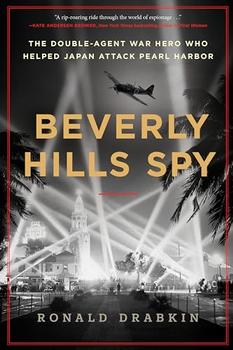Summary | Excerpt | Reviews | Beyond the Book | Readalikes | Genres & Themes | Author Bio

 Book Reviewed by:
Book Reviewed by:
Peggy Kurkowski
Buy This Book
Chapter 1
Pearl Harbor
December 6, 1941
Admiral Husband Kimmel, the commander in chief of the United States Pacific Fleet, granted a rare interview to reporter Joseph Harsch of the Christian Science Monitor. Harsch asked whether Kimmel believed the Japanese would attack the United States.
"No, young man. I don't think they'd be such damned fools."
This was the day before the Japanese attack on Pearl Harbor.
The United States had double the population, vast natural resources, and an economy five times larger than Japan's. It wasn't that the Japanese couldn't attack. It was that they wouldn't. Like many Americans, Kimmel thought that if the Japanese were to attack the far more powerful United States, it would be tantamount to them committing national suicide.
Despite his flippant attitude, Kimmel did have clues that an attack could come. The US Army and Navy were reading many Japanese codes, under a top secret program called Magic. US Navy headquarters had recently sent Kimmel war-warning memos.
On November 27, Kimmel received a message that included, "This dispatch is to be considered a war warning."
On December 3, the navy sent Kimmel a note that Japan had ordered consulates to destroy codes and all but one code machine, a strong hint that a war was imminent.
On the morning of the attack, at six thirty a.m., US destroyer Ward reported that they had just sunk a submarine outside of Pearl Harbor. An hour later, US Army operators saw a large mass of airplanes coming toward Honolulu on their radar scope. They assumed that what they saw on their scopes were American planes.
Just then, the lead Japanese pilot, Mitsuo Fuchida—who was circling just north of Oahu—slid back the canopy on his Nakajima torpedo bomber. He fired a single flare out the window from his Kayaba signal pistol. The flare lit up the early morning sky, giving the pilots the "final go" signal. The weather was favorable with spotty clouds. They dropped altitude and approached the target from the southern side of the island.
A few minutes later, Fuchida saw the American ships in Pearl Harbor. It was a quiet Sunday morning, and many of the American sailors were asleep. Within an hour, thousands of them were dead and the US Pacific Fleet was in ruins.
* * *
In the days after the attack, much of America was consumed with three thoughts: What happened?; How do we get revenge on the Japanese? ; and Whose fault was it?
A few days later, J. Edgar Hoover wrote to President Roosevelt, saying the surprise was the fault of the commanders on the ground, and of the US Navy's Office of Naval Intelligence (ONI, the part known today as NCIS), the agency in charge of anticipating threats from foreign navies. Hoover pointed out, correctly, that ONI was in chaos. The director had just started his job three weeks before, and he was the fourth director just that year.
With the press and the American people crying for blood, the US government kicked off the initial investigation into what happened. However, a thorough investigation wasn't possible because of the need to keep secret the existence of the Magic program. As Hoover had hoped (and intended), the conclusion pointed fingers at the commanders on the scene, Admiral Kimmel and Army General Walter Short, as practically the only guilty parties. They were removed from command and lowered in rank.
In 1944, the secretary of war kicked off a larger investigation led by Henry Clausen of the Judge Advocate General (JAG) Department. Clausen published an eight-hundred-page report that spread the blame beyond just the two men on the scene. To come to this conclusion, he had full access to the Magic files, and he interviewed or had access to over one hundred people, including the heads of the navy and US Naval Intelligence, the army, General Douglas MacArthur, the secretary of state, the Office of the President ... but, strangely, no one from FBI headquarters.
Excerpted from Beverly Hills Spy by Ronald Drabkin. Copyright © 2024 by Ronald Drabkin. Excerpted by permission of William Morrow. All rights reserved. No part of this excerpt may be reproduced or reprinted without permission in writing from the publisher.





The Flower Sisters
by Michelle Collins Anderson
From the new Fannie Flagg of the Ozarks, a richly-woven story of family, forgiveness, and reinvention.

The House on Biscayne Bay
by Chanel Cleeton
As death stalks a gothic mansion in Miami, the lives of two women intertwine as the past and present collide.

The Funeral Cryer by Wenyan Lu
Debut novelist Wenyan Lu brings us this witty yet profound story about one woman's midlife reawakening in contemporary rural China.
Your guide toexceptional books
BookBrowse seeks out and recommends the best in contemporary fiction and nonfiction—books that not only engage and entertain but also deepen our understanding of ourselves and the world around us.